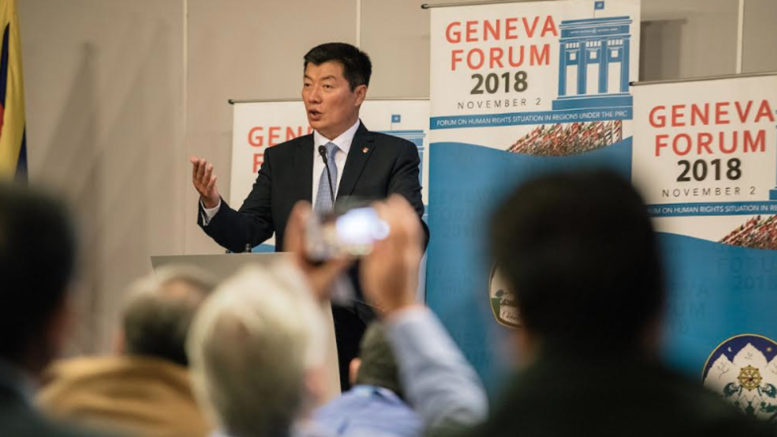Geneva: President Dr Lobsang Sangay, Central Tibetan Administration gave the keynote address at the Geneva Forum – 2018: Forum on Human Rights Situation in Regions under the PRC. The forum was jointly organised by the Department of Information and International Relations (DIIR) of Central Tibetan Administration (CTA) and Office of Tibet Geneva, four days ahead of China’s third cycle of Universal Periodic Review (UPR).
The panel sessions included experts, activists, and academics from all over the world discussing the challenges and the solutions for the UN human rights institutions in holding China accountable for its gross human rights violations given China’s economic power.
President Sangay began by pointing out the futility of the last 20 years where the world has actively engaged with China through business. He said, “They hoped that with economic development, the middle class in China will grow and assert more freedom and democratic rights which will ultimately change China to a democratic system. But it did not happen.”
He further said, “Some advocated that by rewarding China, Chinese leaders will behave according to international norms. After much discussion, the Most Favored Nation title was given to China, with the hope that it will become more liberal, which did not happen. Similarly, China was given the honour of hosting the Olympics with the condition that human rights in China should improve. But this also did not happen.”
On the human rights front, President Sangay said that some experts have recommended that naming and shaming China and Chinese leaders will not be effective and that a quiet diplomacy should be practised to save Chinese leaders’ faces as well as actually improve the human rights conditions in China.
He lamented, “So many countries have fallen in China’s bilateral human rights dialogue trap.” He recalled talking with some of the diplomats engaged in these dialogues for the last twenty years.
“The diplomats realised that these dialogues are essentially fruitless, and the yearly monologues don’t result in anything substantive. In fact, the human rights situation has become bad to worse and some countries are now beginning to feel buyer’s remorse. They have now realised the sinister design of the Chinese government.”
President Sangay then touched on incidences of the Chinese government’s growing influences in countries such as Norway, Australia, the US and Switzerland. “These countries are feeling buyer’s remorse. Example, Australia after realising that Chinese engagements does not pertain only to economics but also influences politics as well as academic freedom has proposed a bill in their Parliament restricting foreign interferences in Australia. Similar debates are going on in New Zealand as well.”
He urged other countries as well to re-examine and revisit their engagements with China.
President Sangay cautioned that China is determined to bring a new world order with the Chinese Communist Party on top of the pyramid.
“China is rigorously promoting “Socialism with Chinese characteristics in the new era” on the international stage. This is President Xi Jinping’s mantra.” Further clarifying, he said, “Socialism with Chinese characteristics means no democracy, one-party dictatorship, and no human rights.”
President Sangay concluded his speech by asking, “If the United Nation’s Human Rights Council cannot make China accountable for human rights violations, then who will? Irrespective of the outcome of the UPR, we have to make sure to hold China publicly accountable through this Forum. We have speakers on Mongolia, Xinjiang, Tibet, Hong Kong, respectable academics, and human rights specialists on China. I leave it to the experts now to make recommendations making the Chinese government accountable. He ended, “Unless we transform China, China will transform us.”
-Filed by Tenzin Dechen, Communication Officer, Sikyong Office

